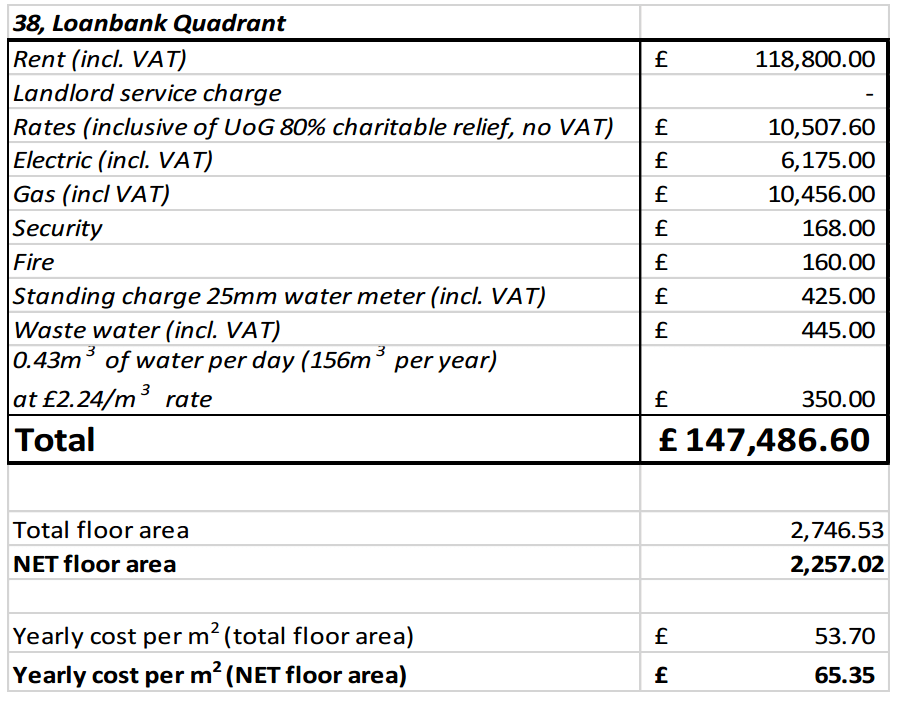Warp It at University of Glasgow
Click here to download the document.
The summary of three month pilot period
Jurate Gemskyte
University of Glasgow
2/26/2015
Summary
As part of an ongoing effort to reduce the amount of
waste we send to landfill, the University of Glasgow
has carried out a three-month trial of Warp It, a
furniture reuse portal, which allows members of staff
upload and claim unwanted furniture items.
During the trial period Warp It generated £67,516 in
savings, attracted over 200 registered users and
enabled the re-use of 421 items of furniture and lab
equipment. Over the same period the total running
costs, associated with the software license,
transportation, salary, storage and promotional
activities were £21,984. Hence the net financial
benefit to the University over the trail period was
£45,532.
The project has also facilitated the rationalisation of
the Govan furniture store, which is now able to
temporarily house the Hunterian museum's rock
collection. The current warehouse space occupied
by The Hunterian is 420m2; the commercial cost of
renting an equivalent space from an external
contractor, would be in the region of £41,000 per
year.
This report discusses all of the preparatory work
carried out, provides a detailed financial analysis,
highlights any problems encountered over the
duration of the trial period and presents a list of
recommendations for more efficient operations in the
future.
Introduction
In order to conserve the worldss natural resources,
reduce carbon emissions, prevent landfill expansion
and avoid the economic costs associated with all of
the above, greater adherence to the waste hierarchy
(reducing, re-using and recycling) is becoming
increasingly important.
Scotland, as a country, has ambitious zero waste plans
and aims to recycle 75% of all waste by 2025, with a
maximum of 5% of waste going to landfill.
Furthermore, Scotland has become first nation to join
the Ellen MacArthur Foundation's Circular Economy
100 programme, which aims to accelerate the
transition to a circular economy in three-year
timeframe, helping organisations rethink the way they
manage resources.
These goals provide a strong reinforcement for
future environmental activities, and require a
significant contribution from public sector bodies,
including the country's higher education institutions.
In the year 2014, University of Glasgow produced
1,896 tonnes of general waste and 236.93 tonnes of
dry mixed recycling, the latter making up 12% of the
total. With the University's carbon footprint
currently standing at 49,423 tonnes for the year
13/14 and the aim of reducing our footprint by 20% in
relation to the baseline year of 10/11, it is imperative
for University to continuously work towards the
shared goals of preserving the environment and
avoiding waste.
In December 2013, the University of Glasgow
purchased a license for Warp It, an online portal
where staff can upload their unwanted furniture items
and equipment for other members of the
organization to claim. The unwanted items can also
be passed on to partner organizations and charities.
This was brought in as a potential solution for not
only reducing the amount of waste University sends
to landfill, but also to reduce purchasing costs when
acquiring furniture. Perhaps most importantly, it
supports a higher step of the waste hierarchy by
enabling staff to reuse unwanted items, rather than
recycling them, or sending them to landfill.
The project
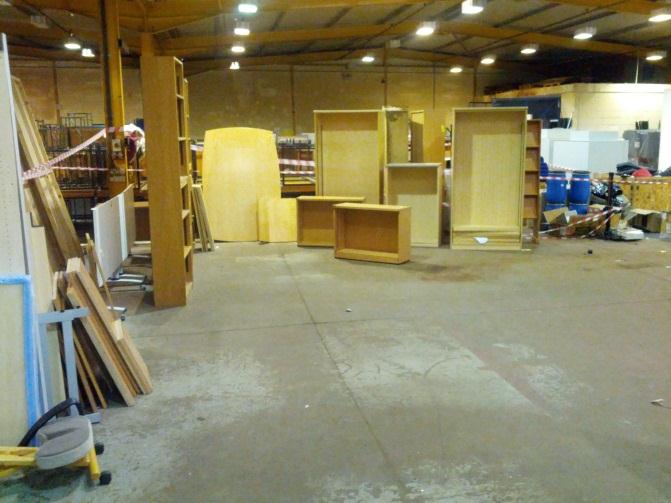
As a part of preparations for launch, significant
changes were made in the University's furniture store
located in Loanbank Quadrant, Govan. Initially, the
store was overloaded with broken or undesirable
furniture, making the whole space difficult to navigate.
Furniture items had to be sorted, assessed for
usability and set out for photographing. The condition
and measurements were also recorded as a part of
the cataloguing process, before uploading them onto
Warp It portal.
During the preparation stages, over two hundred
items were catalogued and uploaded onto the portal,
mostly consisting of filing cabinets, desks, under-desk
cabinets and various chairs.
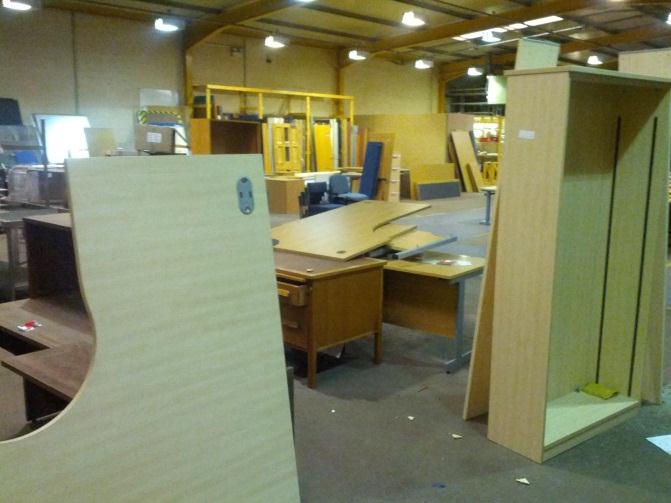
During the preparation stages, over two hundred
items were catalogued and uploaded onto the portal,
mostly consisting of filing cabinets, desks, under-desk
cabinets and various chairs.
During the preparation stages, over two hundred
items were catalogued and uploaded onto the portal,
mostly consisting of filing cabinets, desks, under-desk
cabinets and various chairs.
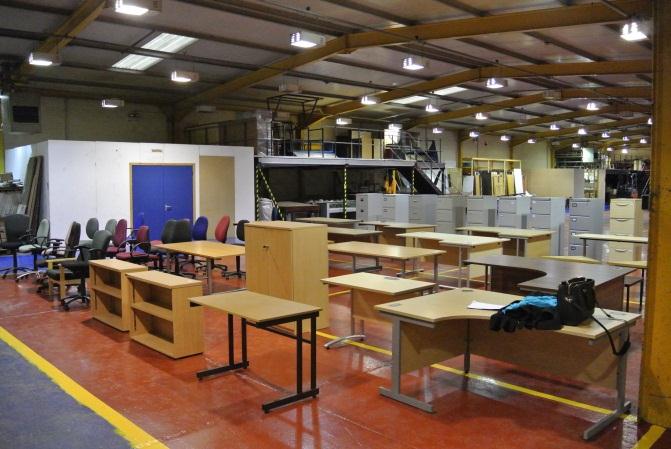
At the same time, new webpages were designed for
Warp It, on the Estates & Buildings section of
University's website. The webpages provide a User's
Guide for members of staff, information on charges
for delivering items, a hotlink to the sign up page and
a flow diagram (see appendix 1), detailing the process
chain for Warp It operations within the University.
Having catalogued all of the good quality items of
furniture in storage, the Warp It portal was
promoted to all members of staff via an article in
campus e-news, on September 17th, 2014 (for all
news articles, see appendix II).
The initial response was very positive, with dozens of
new accounts created during the following week.
Further promotional activities included the design and
production of two posters, aimed at University staff,
to encourage sustainable behaviour by reusing
furniture and diverting waste from the landfill. The
posters were mailed to all of the University's PA's
and purchasing officers, which resulted in a
significantly higher number of claims and sign-up
requests.
The initial trial period was three months long, running
from September 17th to December 17th. The costs to
staff during the trial period were as follows:
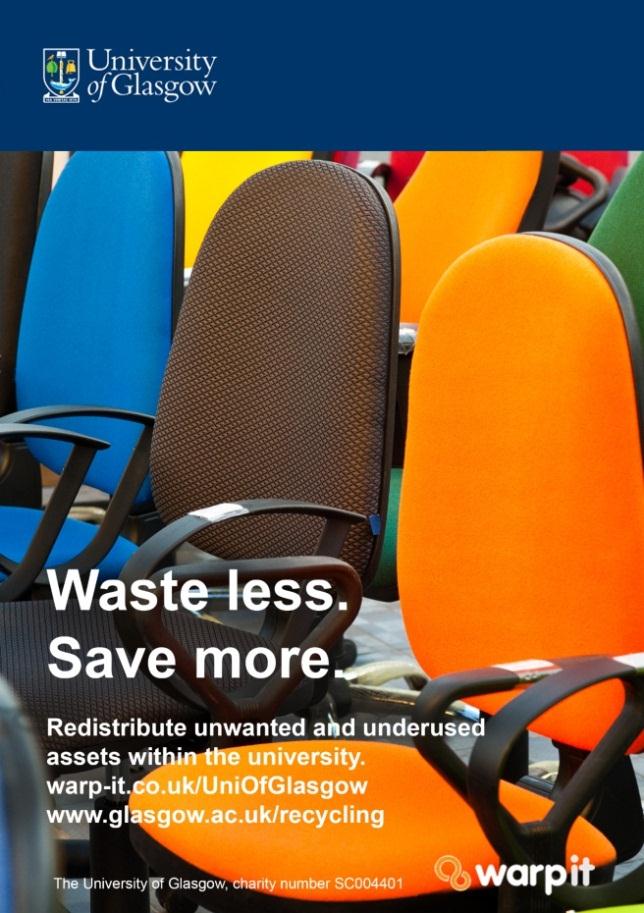
- Moving an item from the Govan furniture store to campus - Free
- Moving an item between any of the campus buildings £10
- Moving an item to the Govan furniture store - £15
Transportation
It was initially agreed that University's external
contractor would do a weekly delivery of items from
Govan to various locations on campus. University
staff in Govan furniture store located the claimed
items and set them beside the entrance, to be picked
up subsequently by external contractor. In a meeting
on November 27th, it was decided to continue trial
with our own staff. This change resulted in significant
cost savings to the University (see Accounts sheet
below).
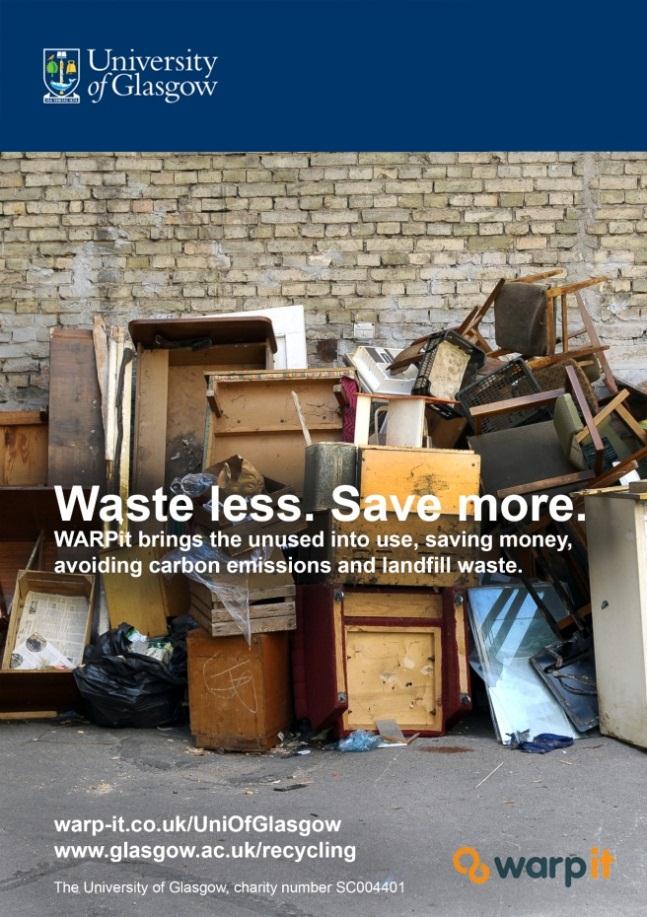
Clearance of the old CVR building
During October 2014, Estates and Buildings were
asked to use Warp It to clear surplus unwanted
furniture from the old Centre for Virus Research
(CVR) building at 8 Church Street. This 4-storey
building contained hundreds of items of office
furniture, as well as dozens of high-value pieces of
specialist lab equipment. Over the following weeks,
the portal witnessed a large increase in claim
requests, with most of the lab equipment being
successfully reused within University. As of February
2015, the building is almost completely cleared of fitto-reuse furniture.
Eco-Hub
A campus e-newsletter published on December 8th
announced that Eco-Hub at the Queen Margaret
Union was the first office on campus to be entirely
furnished from second-hand furniture sourced from
Warp It, including tables, easy chairs, operators'
chairs, felt notice boards and filing cabinets. The
article attracted further interest from University staff
members and increased the number of sign-up requests. The office space is now the home of the
Glasgow University Environmental Sustainability
Team (GUEST)
January promotion
To boost Warp It activity after the Christmas season,
a promotional article was published in campus e-news
on January 19th, a month after the end of the trial
period. The article advertised free fair trade
chocolate bars available on the portal for everyone to
claim. The promotion was a huge success, with the
total number of registered members reaching 336,
with nearly 150 new accounts created. The
promotion also succeeded in encouraging people to
upload their own items, including electrical goods, to
be redistributed across University. Unexpectedly,
newly uploaded items included electric fans, printers,
heaters, lamps, lab stools and a hospital bed. This
highlights the fact that not only furniture, but also
electrical gadgets and stationary can be reused via the
portal. This is something that should be highlighted in
future Warp It promotions.
Warp It savings and methodology
During the three-month trial period, a total of 421
items were claimed via Warp It portal. While the
detailed savings and charts illustrating the variety of
items claimed can be found below, it is worth noting
that the most common types of furniture claimed are
chairs (166 total), pedestals/cabinets (56 total) and
desks (45 total). Meanwhile, items such as filing
cabinets, which make up for a large percentage of
storage space, are claimed extremely rarely and
should, for the most, either be either donated to
charity or recycled.
Savings generated
Over the three month trial period, the portal
generated over £67,000 pounds in savings by reusing
old furniture instead of buying new and diverting
waste from landfill. Over the same period the total
running costs, associated with the software license,
transportation, salary, storage and promotional
activities were £21,984. Hence the net financial
benefit to the University over the trail period was
£45,532. The 8.2 tonnes of waste diverted from
landfill marks a 0.38% saving on the University’s total
annual waste figures. The 22,218kg of CO2e saved
represents a 0.045% reduction on the University’s
annual carbon footprint, based on 13/14 data.
As the project continues, and as of February 27th, the
total savings figure now stands at £125,464, indicating
sustained use of the Warp It portal.
Warp It methodology (warp-it.co.uk)
Financial saving (£)
The system assumes if a staff member claims an item,
it replaces the act of buying a new item. Each item is
given a replacement purchasing value. This is the cost
of purchasing a new item. Each item is also given
waste disposal financial value related to weight and
volume. This aspect can be customised.
Avoided waste (KG)
Each item that is transferred is given a weight value
(KG) based on the ‘Measure Your Treasure’
guidelines, originally produced by the Community
Recycling Network UK (info@crn.org.uk), in
consultation with community waste sector groups.
Avoided supply chain Carbon Emissions (CO2e) (KG)
Carbon and other Greenhouse Gases (GHG) are
given off in the manufacture of products. Every item
transferred using Warp It saves on carbon emissions
because a new item does not have to be
manufactured, transported and purchased. Using
Government guidelines, we are able to apply
conversion factors to various items that are
transferred on Warp It. Thereby producing the
Carbon Equivalent saving on each transaction.
Staff time savings as a cost (£)
This contribution is a reflection of the cost saved
from claiming an item on Warp It compared with
going through the process of buying a new item. On
Warp It there is no need to get a quote for the
item/s, confirm the quote, raise a Purchase Order and
then sign off the invoice. The standard costs across
the sector for raising and processing a PO is £50-
however for transparency this can be customised and
set to zero if required.
Staff time saved (Minutes)
In the same way as above, this metric measures “staff
time saved compared with making a new purchase”
and reflects the time saved by staff carrying out 1
transaction on Warp It compared with purchasing
new.
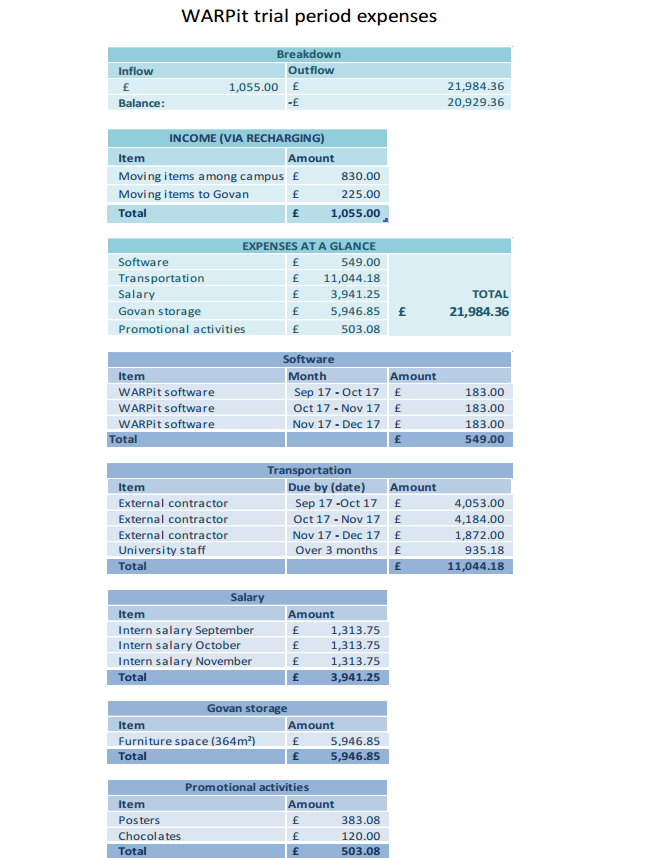
Detailed analysis
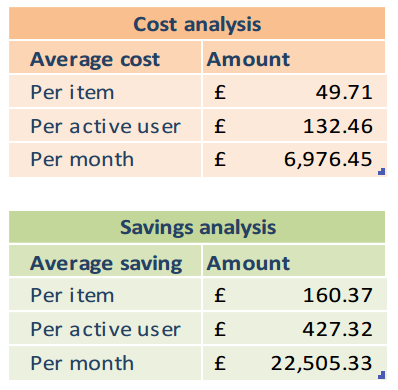
Notes for Accounts Sheet
The cost analysis takes into account all the
expenses detailed in the accounts sheet as well
as the income generated via recharging job lines,
which are required to move items between
campus buildings or for sending them to the
Govan furniture store.
The savings analysis is based on data
automatically generated by the Warp It portal.
Software costs are listed without VAT.
A sharp fall can be seen in external contractor
costs for November- that is when Estates &
Buildings staff took over the deliveries from
Govan to campus.
Intern salary covers a full time position, while
Warp It takes up roughly about 70% of the full
time job.
Govan storage costs were determined by
summing all of the related expenses for the
Loanbank property, and then calculating a per m2 cost
for storage. This per m2 cost was then multiplied
by the floor area occupied by Warp It
furniture. For a detailed cost breakdown relating
to Govan storage, please see appendix III.
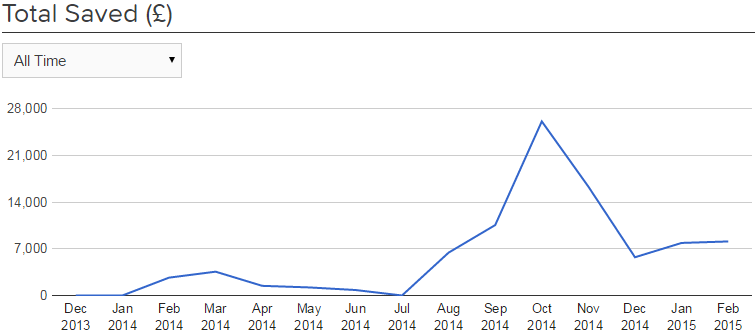
The software was purchased in December
2013 and during the first half of the year
2014, items located in Govan furniture store
were catalogued and uploaded onto the
portal. Since the portal was not yet available
to staff at this stage, the furniture which was
removed from the Govan premises was
claimed off the portal by Estates & Buildings
staff to mark it as reused.
A rapid growth can be seen in the graph in
September, when portal was first launched
via campus e-news.
In October, Warp It was used to help clear
out as much furniture as possible from the
old CVR building (8 Church street). Much
office furniture was uploaded onto the
portal, as well as numerous pieces of
valuable lab equipment, including incubators,
flow cabinets and lab furniture. Due to the
extremely high cost of such specialist
equipment, an unusually high peak can be
seen in the savings curve.
The number of claims fell significantly around
holiday season, however, a small increase
can be seen in January mostly due to the
interest generated by the free-chocolate
promotion. Since the software does not
recognise incentives as savings and only
registers furniture and stationary claims, it
can be concluded that chocolate promotion
was successful in encouraging staff to claim
furniture.
Achievements
See below an illustrated breakdown of user activity,
most popular furniture categories and figures of
savings.
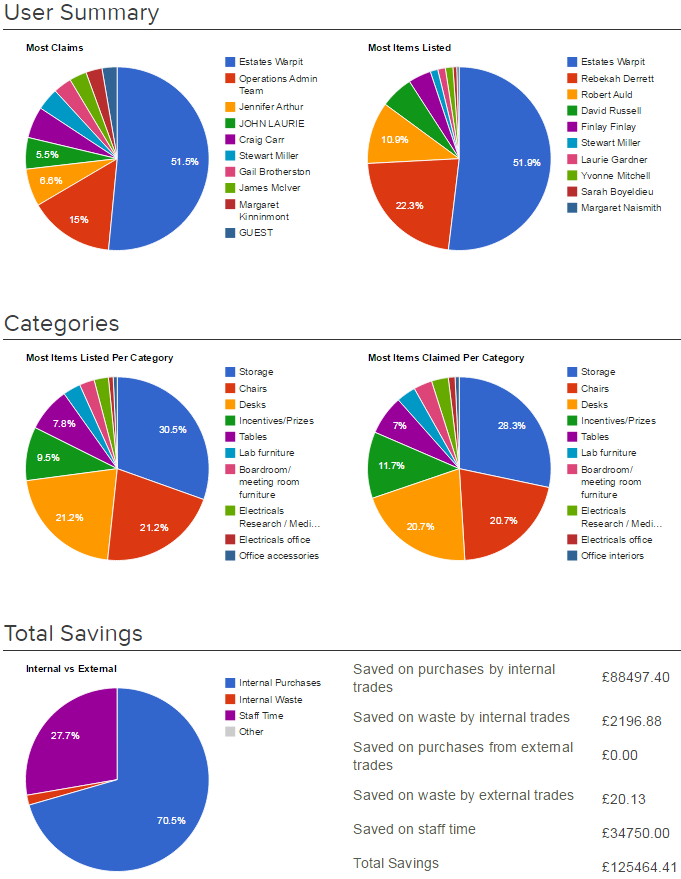
A sample page documenting some of the exchanged items on Warp It
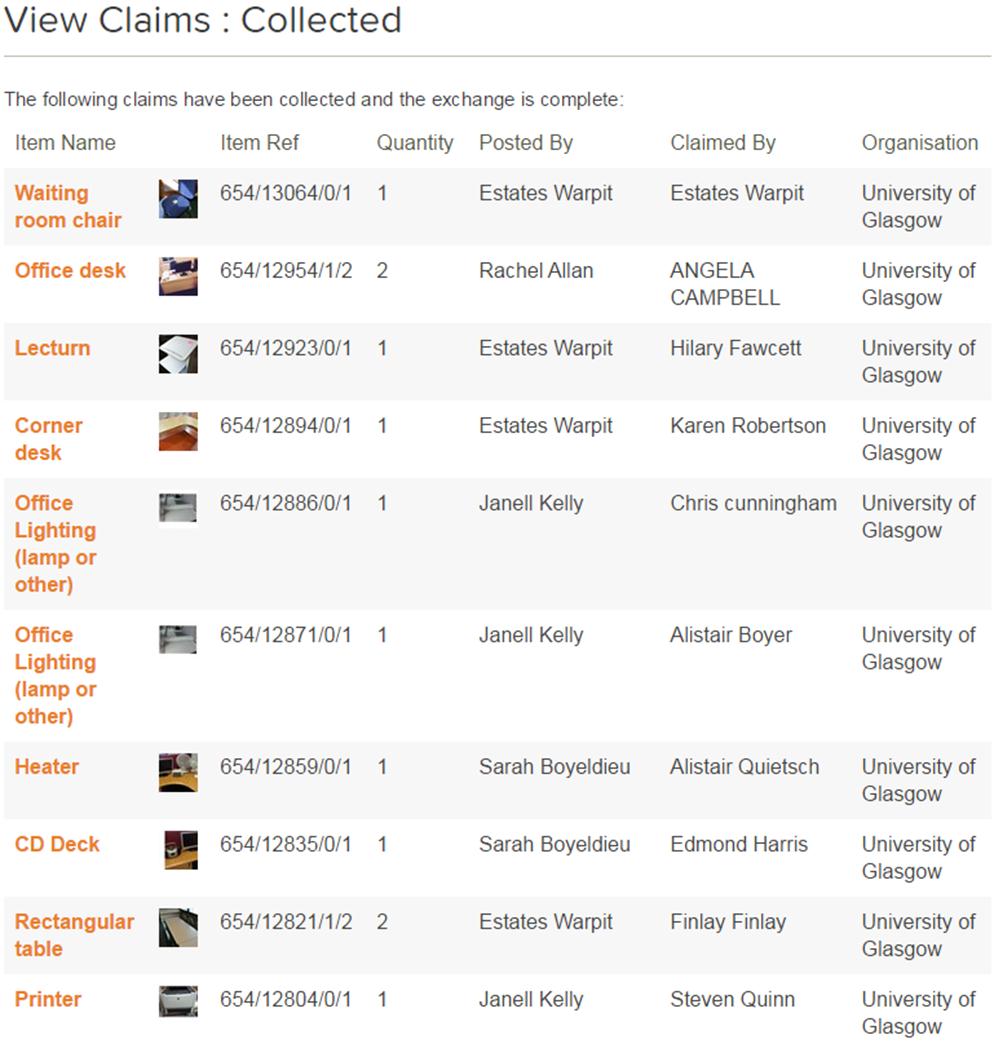
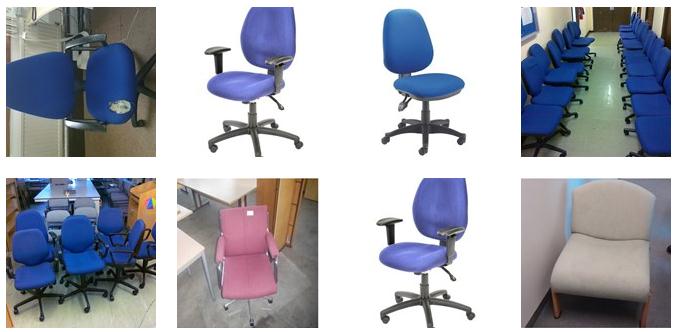
Difficulties
As expected with any project, there were certain
challenges that had to be overcome.
Perhaps the biggest issue encountered was the
reliability of external contractor, which was employed
to carry out many of the internal furniture
relocations. On multiple instances, staff raised
complaints regarding undelivered items, a lack of
communication and damaged furniture.
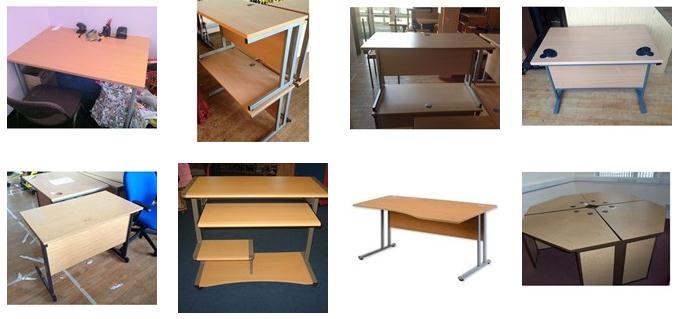
After the initial launch, the E&B helpdesk staff voiced
concerns over the intricacies of recharging the
Warp It job lines; there were difficulties in altering
the charge from the actual cost to the subsidised
price plan. In order to alleviate the task for helpdesk
staff, a list of all job lines for Sep-Dec was analysed,
extracting every Warp It-related job line and
calculating the correct charge manually.
It has also proven difficult to get University staff to
submit Warp It-related helpdesk requests correctly.
There have been many instances of users not clearly
stating what item they claimed, where it is located,
and where they want it delivered to. To combat this
problem, the information pack sent via email after a
user claims an item has been redrafted, putting more
emphasis on the instructions for the correct use of
the Helpdesk. Furthermore, multiple one-on-one
meetings and many explanatory emails and phone
calls have been held in an attempt to educate users.
In certain circumstances it may be feasible to conduct
demonstration sessions or webinars in the future, in
order to ensure that staff understand how to use the
portal correctly.
There were complaints raised by some staff members
that the system was overwhelmingly complicated
when being prompted to choose a furniture category
during the uploading process. The most challenging
task for users was stated to be taking a photograph of
the item they’d like to discard and uploading it onto
the portal. This particular issue could be solved by
highlighting to users the option to use the existing
image library, demonstrated on the right.
It should also be highlighted that furniture items were
repeatedly reported missing from their recorded
locations. In a few instances they were lost by the
external contractor, however, in many cases, items
inexplicably disappeared from the Govan furniture
store, which highlights issues with the management
and supervision of Govan sotres. This has also proven
to be a problem in old CVR building, where staff had
returned to pick up catalogued furniture items for
their new offices, without giving any notice to
Warp It staff.
Perhaps most importantly, E&B staff are still required
to make trips to Govan furniture store to document
newly delivered second-hand furniture. This reveals a
significant issue with the current Warp It process
chain, since all furniture being delivered to Govan for
storage ought to be already catalogued and uploaded
on to Warp It. This issue should be discussed more
widely with the E&B helpdesk and relevant
supervisors, to try and reduce the scale of the
problem. The Govan store is clearly still perceived as
a convenient dumping ground for unwanted items.
Overall, all these issues can be overcome with better
communication between all of the parties involved in
the process chain and by placing a stronger emphasis
on the existing instructions.
Discussion
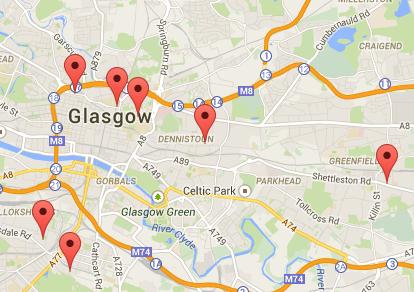
All in all, the trail period can be considered a
tremendous success, attracting the interest of ~200
members, with the exchange of 421 items achieving
net cost savings of over £45,000. There have been
countless instances of positive feedback, with users
expressing excitement over the project. In addition,
there are also opportunities for future collaborations
with other Glasgow organisations, both in the public
and charity sectors.
Another notable positive outcome of the Warp It
project is the space that has subsequently been
cleared in the University’s furniture store in Govan.
Hundreds of furniture items were claimed from the
store and delivered back for active usage on campus.
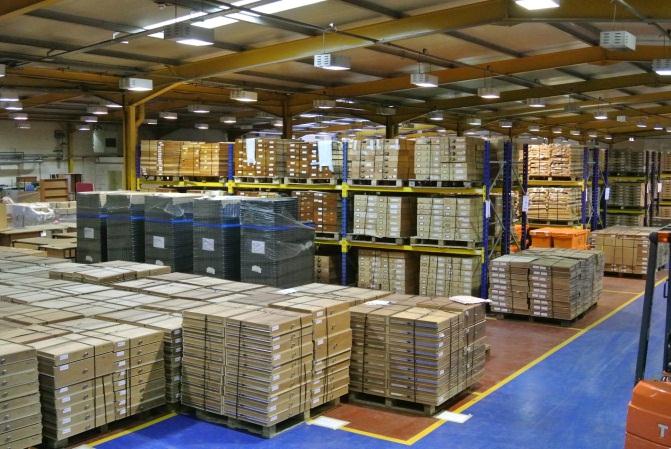
This has subsequently allowed for other projects to
take advantage of the space, primarily the Hunterian
museum’s rock store, which is now temporarily
located in Govan, while awaiting the refurbishment of
new premises. The current warehouse space
occupied by The Hunterian is 420m2
; the commercial
cost of renting an equivalent space from an external
contractor, would be in the region of £41,000 per
year.
While The Hunterian and other departments are not
currently charged for storage at the Govan
warehouse, it is worth discussing whether
departments should be charged for this service in the
future.
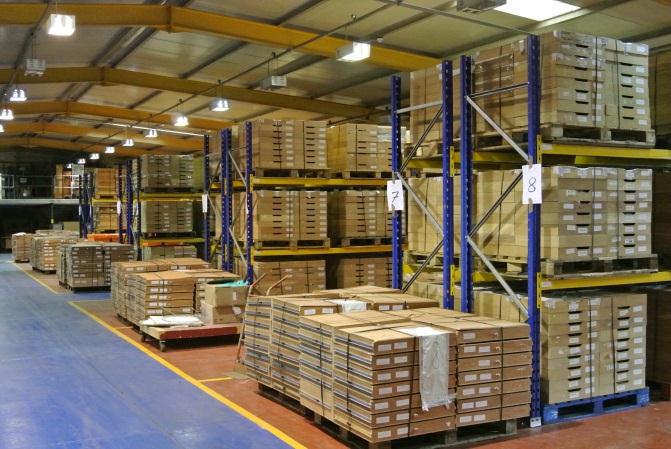
Following the success in clearing furniture and
specialist lab equipment from the old CVR building, it
is strongly suggested that Warp It is used to clear out
buildings for future relocation projects. To maximize
efficiency, closer ties with E&B projects staff are
recommended, to ensure that any available furniture
is documented well in advance of the actual
relocation. Cataloguing the furniture well in advance
of the move provides for a longer advertising period
on the portal, increasing the chances of someone
claiming the item and having it delivered as soon as
the building is vacated.
It must also be highlighted that Estates & Buildings are
currently subsidising the transportation costs
associated with the Warp It system; future delivery
costs for users should be reviewed and Estates
should consider whether central funding might be
available to cover the cost of what is a valuable
service for University staff.
Testimonials
Here are some examples of what University staff had
to say about using Warp It:
“Just to say that the Warp It set up is a great help to
me. I no longer need to try and make a synchronised
visit to Govan with John and Alec - I can do it all from
my desk.” - John Laurie
“I guess everything gets more complex and I note this
new system one has to register for it with a whole new
logon and password, so given that our lives are
complicated enough here and we have so many
different systems to logon to daily, we probably won't
be doing this or using the Govan Storage any longer.” - Sylvia Morgan
“I think the website is an excellent idea and look forward to using it in earnest.” - Alison McGuiggan
Conclusions
- The net financial benefit to the University over the three month Warp It trail period was
£45,532. During the same period, over 8 tons of waste were thus diverted from landfill and over
22 tons of associated carbon emissions were avoided.
- The project has facilitated the rationalisation of the Govan furniture store, which is now able to
temporarily house the Hunterian museum’s rock collection. The current warehouse space
occupied by The Hunterian is 420m2; the commercial cost of renting an equivalent space
from an external contractor, would be in the region of £41,000 per year.
- The store has now also been marked out in discreet bays, with the potential to start
charging users on a m2 basis for their storage.
- Warp It was very successful in facilitating the clearance of the old Virology building. In order
to reduce the costs of building clearances in the future, it is recommended that E&B projects
staff engage with Warp It at the earliest available opportunity,
- Efficiency in the Warp It process chain could be significantly improved by providing more
guidance to both registered users and helpdesk staff.
- The most costly aspect of the project during the trial period was transportation; it is therefore
suggested to use E&B staff to carry out deliveries, rather than the external contractor,
who was oftentimes unreliable.
- In order to increase the variety of items available to staff on Warp It, the potential of a
Warp It partnership with other charitable and public sector organisations should be
investigated.
Appendices
Appendix I – FLOW CHART
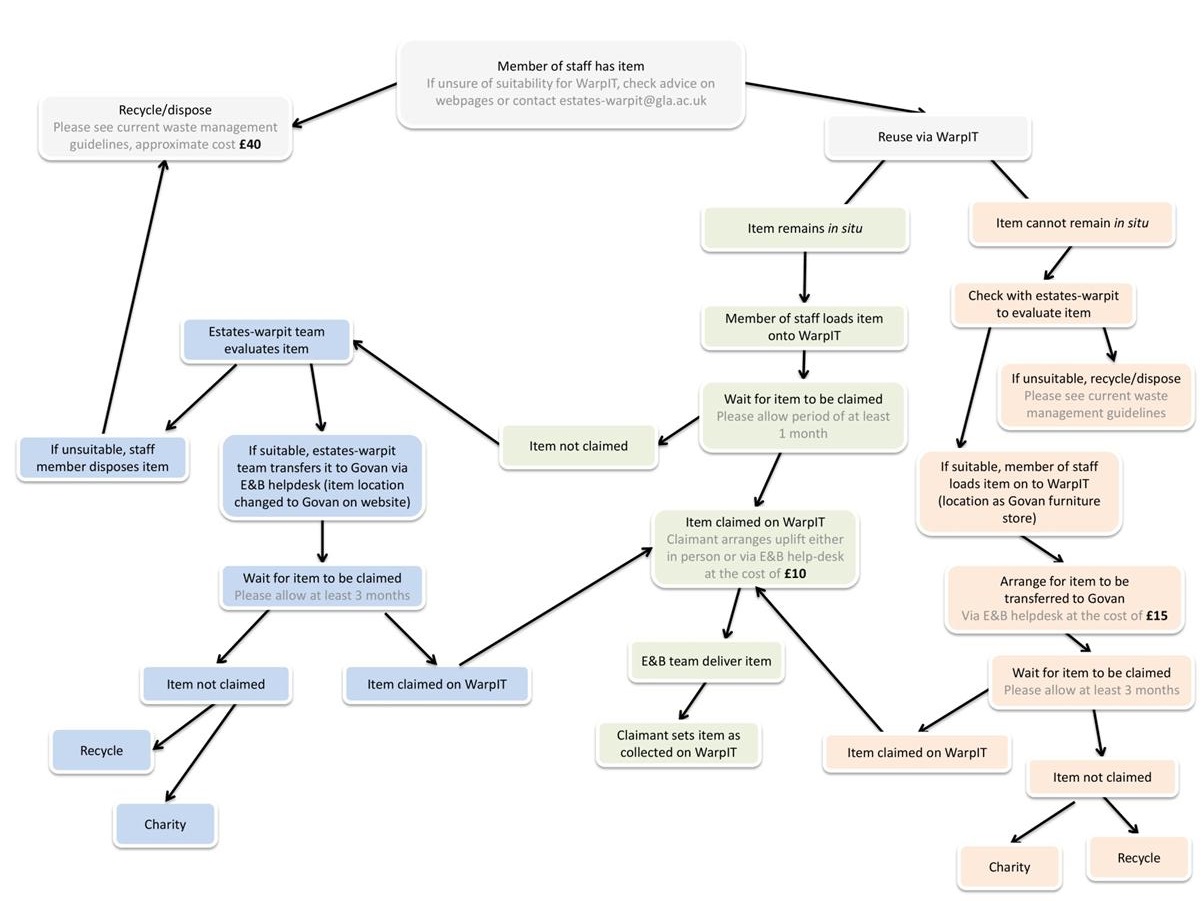
Appendix II – NEWS ARTICLES
Launch article – September 17th, 2014
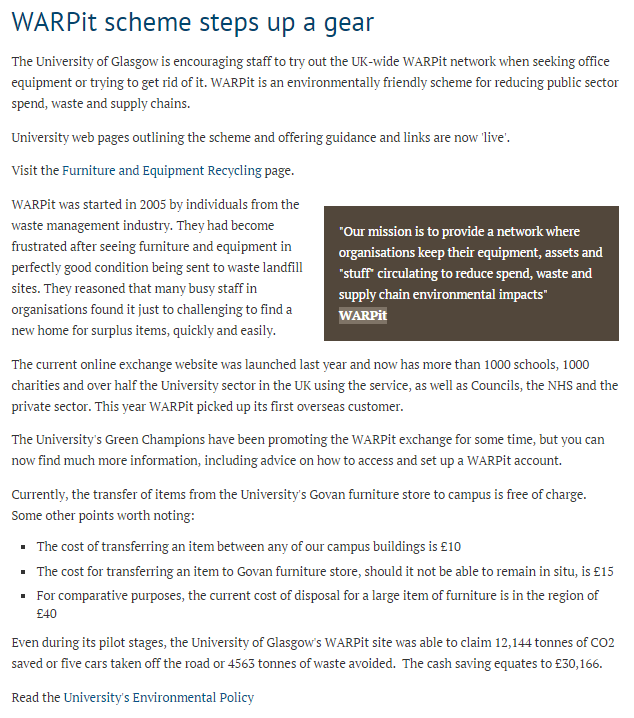
EcoHub article – December 8th, 2014
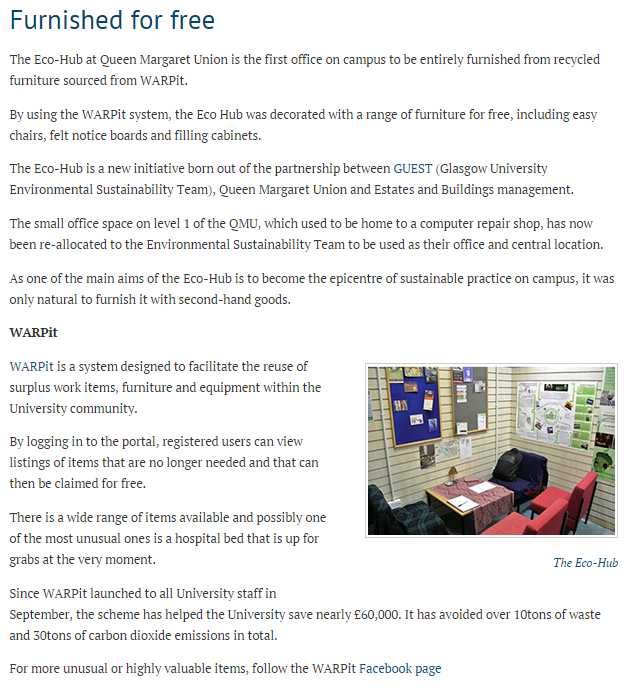
January promotion – January 19th, 2015
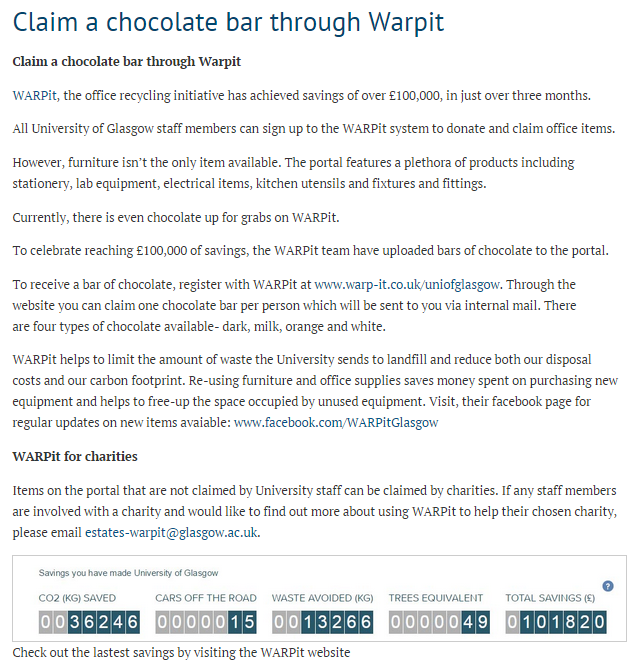
Appendix III – DETAILED COST BREAKDOWN FOR GOVAN FURNITURE STORE
